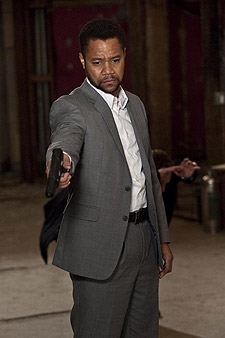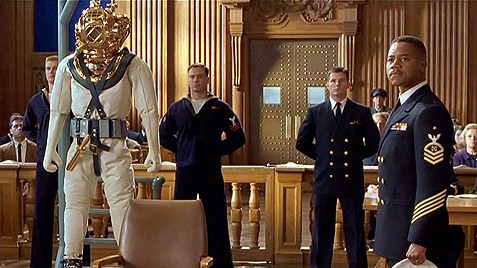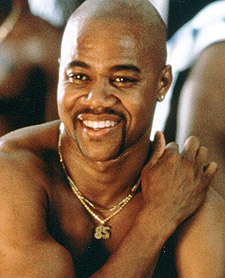
Interview Date: 04/04/2011
Run Date: 05/10/2011
Interviews Home / Movies Home / Bullz-Eye Home
Cuba Gooding Jr. first made major waves as an actor with the role of Tre in John Singleton’s “Boyz ‘n’ the Hood,” but it was his role as football player Rod Tidwell in “Jerry Maguire” that really did a number on his career, positioning him to appear in films alongside such heavyweights as Jack Nicholson (“As Good As It Gets”), Robin Williams (“What Dreams May Come”), Anthony Hopkins (“Instinct”), and Robert DeNiro (“Men of Honor”). In recent years, however, Gooding has been less prevalent on the big screen than in video stories, continuing to headline films with notable co-stars, including Val Kilmer and Harvey Keitel, but finding them released straight to DVD. Bullz-Eye chatted with Gooding about his most recent such release – “The Hit List,” co-starring Cole Hauser – and found out about the mix of excitement and frustration that comes with these motion pictures, got some insight into some past roles, and found out what question a writer has to ask to get an Academy Award Winner to give you a big fat “f**k you.”
(Note: he was kidding when he said it. But he still said it.)
Bullz-Eye: So how do you go about finding your projects nowadays? I know you’re generally the lead of the films that you’ve been doing, so I’m presuming that they’re being pitched specifically to you rather than it being a case where you’re auditioning for the roles.
Cuba Gooding, Jr.: Yeah, it’s so funny…I’ve been talking a little bit about this today, so I just need to gather my thoughts here, so I don’t leave anything out. (Takes a deep breath) After the Academy Award, when I got a lot of offers to work and took a lot of meetings with filmmakers I admire, from Spielberg on down, we all sat and talked about how great it’d be to collaborate on a project. I think I got stuck in a vacuum, though, in that the opportunity to work together never presented itself except in a few rare cases. One being…Oliver Stone and I talked about doing the Martin Luther King story, and one thing led to another, and be it a rights issue or a budget issue, it just didn’t happen. And, you know, he says to me, “Let’s look for something else.” And here we are eight or nine years later… (Laughs) …still waiting! And I remember Ridley Scott saying what so many other filmmakers – you know, these are guys that I was dying to work with! – finally coming to me with “American Gangster.” At least it was something. My agent said, “Well, listen…” There was a frustration there, ‘cause they were, like, “If we’re going to wait for the crème de la crème, it’s gonna be awhile. I mean, you have to work!” And I believe that. I believe that, as actors, we’re perishable fruit. And the other thing is, we don’t have the opportunity to practice unless we’re paid. So there’s a frustration that sets in. There were a lot of TV offers, to do television roles, and…as an actor, I feel that I give my all for the character, and if I’m successful, it’s someone you believe I am during that experience. It works in two hours, two and a half hours in the theater, but the fear would be that I would be that guy for eight, ten years. And how can I ask my audience to follow me to the next character when they’ve seen this one for so long? So there was always trepidation there for that, so that kind of brought me to these smaller (films).
There were a couple of things that happened at the same time. There was a zeitgeist that…the writers had gone on strike, and it freed up a lot of these really interesting scripts from the studios. And the producers started collaborating with financiers directly on a much smaller scale, and they said, “We would like to tell these stories, but we obviously can’t do them for the grand budget. But we can do them for a simplified budget if we have the talent that’s willing to cut their fee.” So I said, “You know what? It’s either Broadway…” And I came from theater, so that was interesting, but I didn’t want to uproot my family to New York from Los Angeles. “…or it’s going back to school with these opportunities.” And that’s exactly what happened. You know, I got to work with a lot of first-time filmmakers and do really interesting stories. I got to travel the world. I went to Bulgaria and did this movie “Hero Wanted.” And then I really got to do what I started out my career to do: to play these really diverse characters. And (“The Hit List”) was one of those characters was one where I knew I could take the audience on a journey they hadn’t seen me in. Well, except for this brief role I did in this movie “Dirty,” but a lot of people didn’t see that character. And this was something else. That character was evil for evil’s sake. I mean, he was caught up and was a victim of his surroundings. But this guy was good at what he does…and, unfortunately, it was killing. And here was this story about this killer that happens across an everyday man. Not even an everyday man, but a man who didn’t have the qualities that he had to defend himself. And it’s interesting.
 I want to talk about Cole Hauser, because I’ve been a Cole Hauser fan…I’ll tell you, John Singleton and I have been friends since we worked together on “Boyz ‘n’ the Hood,” and John says to me, “Here’s my new movie ‘Higher Learning,’” and I watched this movie, and I said, “I got to be honest with you, man: you really screwed the pooch, in that the most powerful performance in your movie comes from this Nazi!’” (Laughs) I said, “I don’t know who this kid is, but he’s got it!” And I told Cole Hauser that then, and I’ve been waiting for the opportunity for us to work together. When it was reached on this project, it was…you know, there was some trepidation, ‘cause the model for the character was Joseph Gordon Levitt, a guy who wouldn’t outwardly be seen as someone who’d be able to handle himself, just a frail type of man. And then here’s Cole, who’s taller than me, more muscular, and everything. But I knew when they said his name…I said, “If a real actor wants to do it, we’ll make it work.” And we did. He brought that dynamic to his performance…I mean, there was this scene where I shoot this guy in the knee and I turn to him, and he’s cowering! And we say, “Cut,” and I say, “Are you all right?” And then he stands up and he’s looming over me again! (Laughs) To me, it’s, like, that’s the juice, man. That’s the exciting part of being an actor: getting in those moments.
I want to talk about Cole Hauser, because I’ve been a Cole Hauser fan…I’ll tell you, John Singleton and I have been friends since we worked together on “Boyz ‘n’ the Hood,” and John says to me, “Here’s my new movie ‘Higher Learning,’” and I watched this movie, and I said, “I got to be honest with you, man: you really screwed the pooch, in that the most powerful performance in your movie comes from this Nazi!’” (Laughs) I said, “I don’t know who this kid is, but he’s got it!” And I told Cole Hauser that then, and I’ve been waiting for the opportunity for us to work together. When it was reached on this project, it was…you know, there was some trepidation, ‘cause the model for the character was Joseph Gordon Levitt, a guy who wouldn’t outwardly be seen as someone who’d be able to handle himself, just a frail type of man. And then here’s Cole, who’s taller than me, more muscular, and everything. But I knew when they said his name…I said, “If a real actor wants to do it, we’ll make it work.” And we did. He brought that dynamic to his performance…I mean, there was this scene where I shoot this guy in the knee and I turn to him, and he’s cowering! And we say, “Cut,” and I say, “Are you all right?” And then he stands up and he’s looming over me again! (Laughs) To me, it’s, like, that’s the juice, man. That’s the exciting part of being an actor: getting in those moments.
BE: I would just like to say for the record that the next question on my list had actually been, “What was it like working with Cole Hauser?”
CGJr: (Explodes into laughter) Awesome! He really was a joy, though. And I will say one other thing about this cat: he is – to be braggadocious – a physical guy. Physical. I mean, we would wrestle and punch each other off-camera, and then we’d get on set again and I’d feel very protective of him when he was in character. That says a lot about him as an artist.
BE: How was William Kaufman as a director? I know he hasn’t done that many films, but when a director’s got a vision for a project, it doesn’t necessarily matter.
CGJr: Well, it was interesting. I actually brought him to this project because the writer…I see Chad (Law), and I brought him to the project because Chad had sent me a trailer for (Kaufman’s) movie “Sinners and Saints,” and I was so blown away by the visuals in that trailer. And when I heard they did it for literally and absolutely no money…I mean, when you hear “no money” in Hollywood, it’s a million dollars or maybe $500K, but this guy did his movie for favors. I was, like, “That is amazing!” I said, “If we can get someone like that to tell this tale, we might visually have something people haven’t seen at this budget before.” And that’s exactly how it started. You know, it reminded me…I was sitting with James Brooks, doing “As Good As It Gets,” and he was, like, “I want to see you bigger than life, man!” You know, that’s how Kaufman was. He’s, like, “I want you to grow the beard, I want you to be this guy,” and it really brought me back. And I think people are so going to see so many wonderful things from William.
BE: You know, it’s weird hearing you talk about working with a young director being all, like, “You remind me of a young James L. Brooks.” Do you feel like the old man on the set now?
CGJr: (Bursts out laughing) Fuck you, man! That’s not something you say! “The old man.” (Laughs) I will say that when people see me, they’re surprised that I’m in my 40s. They always say, “Oh, you’re in such good shape, you look much younger than you are,” or whatever. But then I get on the set, and…it’s true. I’ll have DPs, APs, directors come in my trailer and go over shots with me! I did this other movie, “Sacrifice,” the next one coming out, and it’s another small film with an interesting character, and, literally, the director and I would sit down on Sundays and go over the shot list before we started filming on Mondays. And, again, it’s things like that where…you can’t pay for education like this. I think it was God’s will that I got stuck in that little bit of a quagmire that forced me into just kind of going back to school with these movies. I mean, that’s not the reason I did “Daddy Day Camp.” (Laughs) But for the most part, when I get an opportunity like this, with a great script and an unproven director that has what I think is it, it’s just a blessing.
BE: Now, I did not have the question “Why did you do ‘Daddy Day Camp’?” on my list. But if you’ve got an answer, I’d love to hear it!
CGJr: (Laughs) You know what? Because my boys, they’ve moved on, they’ve just turned 14 and 16, but then we had another kid, Piper, right around that time. A little girl. And I was, like, “You know, there’s going to be a time where she can’t see these movies for a long time.” So it got me back into that kid mindset. So that’s why.
BE: With “The Hit List,” did you have to practice that death rattle of a cough?
CGJr: (Laughs) Yeah, a little bit. It’s all part of the character, man. All the little things you do.
BE: Not to dwell on this, but you work with Cole Hauser on this, you had Harvey Keitel in “Hardwired,” and “Wrong Turn in Tahoe” found you with Val Kilmer, yet the films are not going to theatrical release. I know it’s kind of the nature of the business nowadays, but it’s still got to be frustrating.
CGJr: Yeah, it’s frustrating, but I’ve got to be honest with you. I did a movie called “Men of Honor,” it was in theaters, the studio – 20th Century Fox – said it was a disappointment, but it’s done so much money on video…I think it’s my highest grossing DVD. It’s something like $200 million on DVD. And I think if you tell a good story, people will find it. I know that I’ve been in Beirut, Lebanon, I’ve been in Australia, and different places, and people talk about these movies, you know? They talk about these things that, even though they’re not going theatrical domestic, foreign they’re really making an impact. Sometimes foreign they are in the theaters. So I can’t really worry about the distribution. I can just keep working.

BE: Speaking of “Men of Honor,” when I mentioned on Facebook that I was going to be talking to you, a buddy of mine who was stationed on the U.S.S. Harry S. Truman said, “Why, I don’t believe I’ve seen him since we made him an honorary chief!”
CGJr: Oh, wow! Well, he’s really going to like this new movie, “Red Tails,” ‘cause we go back to the military for this one. George Lucas has put together not only a story that…well, yes, it’s a history lesson, but visually you will not believe what you’re going to see. What I’ve seen is breathtaking. It really is. It’s, like, you know how “Avatar” has something like 1400 visual effects? We have more than that. It’s just insane. It really is gonna blow people away. I know he’s putting it together now for the end of the year, and I’m excited about it.
BE: To talk about “Boyz ‘n’ the Hood,” it’s one of those movies that it’s okay for guys to cry during. What was that experience like for you? It was very early in your career, but it was definitely a game changer for you.
CGJr: It was. It really was. It’s the 20-year anniversary this year, too. You know, that was the first time I had to go after a part I wanted. Well, no, not the first time…and not even the last time, ‘cause I had to go after the role in “Red Tails.” But it was just one of those things where everything clicked. It was a time when people were so frustrated by these drive-by shootings and all this senseless violence, they just thought there were a bunch of animals down there, and then you had this story of this group of kids that you identified with, that were living their lives with drive-bys one minute and then going back to partying the next. Or going to the store and then ducking from gunshots and then continuing on to the store. It’s, like, I’m sure people in the Middle East, in these extremely violent societies, can relate to how there’s still a little bit of humanity prevalent there. That character, Tre, I felt – especially at the time – that I was going to be the eyes of the audience, to walk them through this story, and it was really important. And it affected a lot of filmmakers that I still have a relationship with today, so…I’m proud of it.
BE: With “Jerry Maguire,” do you sometimes get annoyed that your Academy Award speech has a tendency to get as much attention as the work you did in the film?
 CGJr: No, no, no. You know, it’s so funny. It’s why I get so frustrated with so many behind-the-scenes things, ‘cause people really do equate you with what they see, and the more they see behind the curtain, the less they’re going to be blown away by a character or be willing to walk down the road with a character. I knew when I first got up there during that ceremony that I was in trouble. (Laughs) But you know what I mean? People still come up to me and say, “Tre!” Or they say, “Show me the money,” or whatever. Or they say like you just said, “That Academy Award acceptance speech…” It’s usually women, you know. (Laughs) They like to bring that up. But, you know, at the end of the day, hopefully there’ll be 15 other moments like that in my career that people can talk about. In a positive way, mind you. Not something crazy.
CGJr: No, no, no. You know, it’s so funny. It’s why I get so frustrated with so many behind-the-scenes things, ‘cause people really do equate you with what they see, and the more they see behind the curtain, the less they’re going to be blown away by a character or be willing to walk down the road with a character. I knew when I first got up there during that ceremony that I was in trouble. (Laughs) But you know what I mean? People still come up to me and say, “Tre!” Or they say, “Show me the money,” or whatever. Or they say like you just said, “That Academy Award acceptance speech…” It’s usually women, you know. (Laughs) They like to bring that up. But, you know, at the end of the day, hopefully there’ll be 15 other moments like that in my career that people can talk about. In a positive way, mind you. Not something crazy.
BE: What would you say is your favorite project that you’ve worked on that didn’t get the love you thought it deserved?
CGJr: (Long pause) Well, it’s kind of a two part question. My favorite project probably would be “Men of Honor,” just because it’s affected so many audiences around the world, and if you’d asked me this question ten years ago, I definitely would’ve said, “‘Men of Honor,’ ‘cause it didn’t get the recognition!” But I’m telling you, people are really finding that movie. There’s a couple of interesting of these smaller movies, like this one, “The Hit List.” I hope people find it. There’s a frustration there in hoping that, even though it’s not going theatrical, people will find the movie and talk about it.
BE: Well, for what it’s worth, I have to say that I think it’s the best of the straight-to-DVD films that you’ve done…and they generally send them to me, so I’ve seen most of them.
CGJr: Thank you, man.
BE: But I notice that you haven’t really done an out-and-out comedy since…geez, I guess it’d have to be “Harold,” in 2008.
CGJr: Yeah, “Harold” was a funny script. I think…again, we didn’t have the resources that the director needed to realize his vision on that. It was a first-time director on that one, and…it was what it was, you know. Also, too, I try not to categorize films when I read them. “Is it a comedy? Is it a drama? Is it action?” I just try to look at the story and the character and go with it. A lot of the “comedy” scripts that have come down haven’t really blown up my skirt up, either the story or the character they want me to play in them.
BE: But is that something you’d like to return to, given the right material?
CGJr: Of course, of course! You know, listen, if Cameron Crowe called tomorrow and said, “Listen, Cuba, I want to do this,” and it was the funniest thing I’d ever written, I’d be in it in a minute.
BE: Okay, I know I’m up against the wall here, but I just wanted to tell you – and take this as you will – that Drew Carey and I once had a really great conversation about how much he loves “Boat Trip.”
CGJr: (Laughs) Oh, yeah?
BE: Yeah, I wouldn’t necessarily go so far as to say that he was complimentary, but he basically said, “I’m obsessed with it. I can’t stop watching it.”
CGJr: Well, there’s something to be said about the experience of watching a movie, good or bad. There’s something to be said about the Razzie Awards. (Laughs) I’m not saying that “Boat Trip” was a travesty, but it definitely got people talking. I mean, Chris Rock mentioned it during his hosting of the Oscars! So there you go. I mean, if it’s my job to move people emotionally, I did that with “Boat Trip.” For good or bad. (Laughs)
You can follow us on Twitter and Facebook for content updates. Also, sign up for our email list for weekly updates and check us out on Google+ as well.











